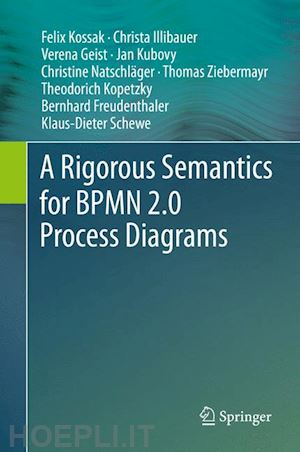
Questo prodotto usufruisce delle SPEDIZIONI GRATIS
selezionando l'opzione Corriere Veloce in fase di ordine.
Pagabile anche con Carta della cultura giovani e del merito, 18App Bonus Cultura e Carta del Docente
This book provides the most complete formal specification of the semantics of the Business Process Model and Notation 2.0 standard (BPMN) available to date, in a style that is easily understandable for a wide range of readers – not only for experts in formal methods, but e.g. also for developers of modeling tools, software architects, or graduate students specializing in business process management.
BPMN – issued by the Object Management Group – is a widely used standard for business process modeling. However, major drawbacks of BPMN include its limited support for organizational modeling, its only implicit expression of modalities, and its lack of integrated user interaction and data modeling. Further, in many cases the syntactical and, in particular, semantic definitions of BPMN are inaccurate, incomplete or inconsistent. The book addresses concrete issues concerning the execution semantics of business processes and provides a formal definition of BPMN process diagrams, which can serve as a sound basis for further extensions, i.e., in the form of horizontal refinements of the core language.
To this end, the Abstract State Machine (ASMs) method is used to formalize the semantics of BPMN. ASMs have demonstrated their value in various domains, e.g. specifying the semantics of programming or modeling languages, verifying the specification of the Java Virtual Machine, or formalizing the ITIL change management process.
This kind of improvement promotes more consistency in the interpretation of comprehensive models, as well as real exchangeability of models between different tools. In the outlook at the end of the book, the authors conclude with proposing extensions that address actor modeling (including an intuitive way to denote permissions and obligations), integration of user-centric views, a refined communication concept, and data integration.
The authors are experienced industrial researchers in the field of computer science and software engineering, with experience in business process modelling and formal methods in particular. They have been working in a joint team from the Software Competence Center Hagenberg (SCCH) and the Institute for Application Oriented Knowledge Processing (FAW) of the Johannes Kepler University Linz (JKU), both in Austria.











Il sito utilizza cookie ed altri strumenti di tracciamento che raccolgono informazioni dal dispositivo dell’utente. Oltre ai cookie tecnici ed analitici aggregati, strettamente necessari per il funzionamento di questo sito web, previo consenso dell’utente possono essere installati cookie di profilazione e marketing e cookie dei social media. Cliccando su “Accetto tutti i cookie” saranno attivate tutte le categorie di cookie. Per accettare solo deterninate categorie di cookie, cliccare invece su “Impostazioni cookie”. Chiudendo il banner o continuando a navigare saranno installati solo cookie tecnici. Per maggiori dettagli, consultare la Cookie Policy.